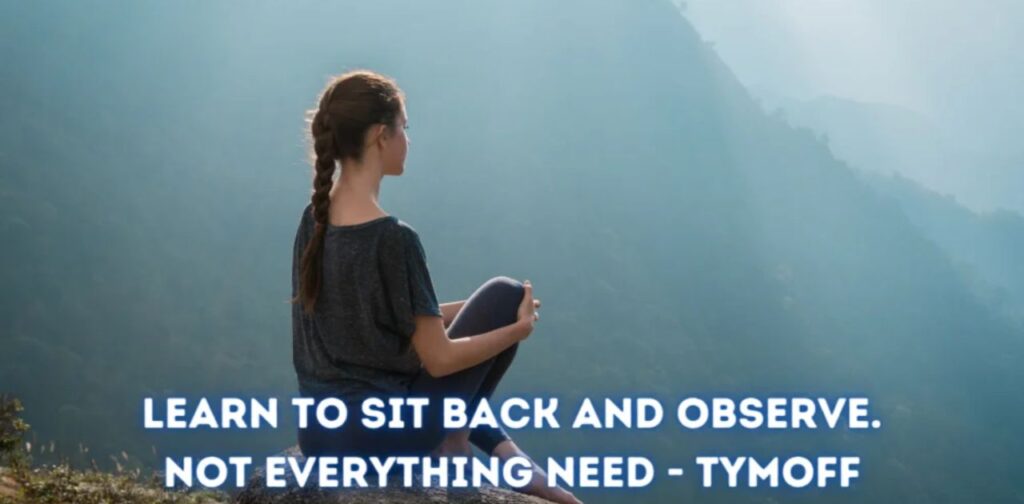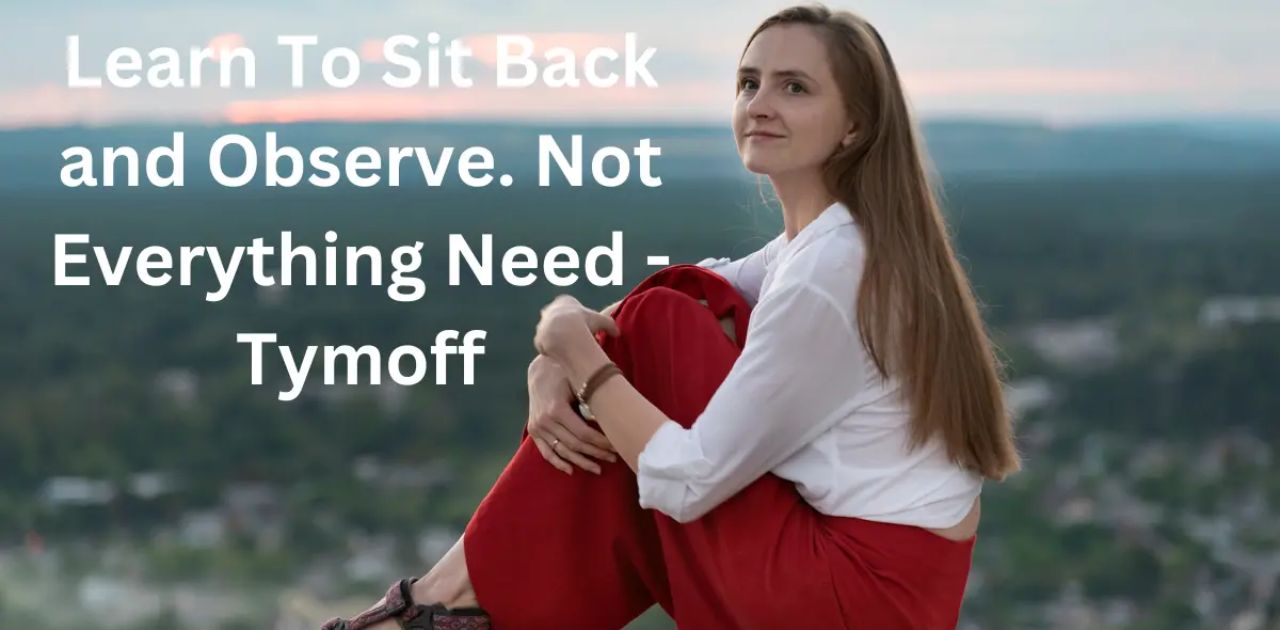In today’s fast-paced world, it’s easy to feel overwhelmed and pressured to react immediately to every situation that comes our way. However, learning to sit back, observe, and observe. not everything need – tymoff can bring immense benefits to our overall well-being.
By taking the time to reflect before reacting, we gain valuable insights, make more thoughtful decisions, and cultivate a peaceful state of mind. This approach not only helps in managing stress but also fosters personal growth, self-awareness, and a deeper sense of contentment in everyday life.
The Importance of Taking Time Off
In the age of constant connectivity and productivity-driven lifestyles, the concept of taking time off often feels foreign, if not indulgent. Yet, this notion is more important than ever. Taking time off, whether in the form of a vacation, a weekend retreat, or simply a short break during a busy day, is essential to maintaining a balanced and healthy life.
It provides us with the opportunity to reset, gain perspective, and return to our responsibilities with a refreshed mind. Without regular breaks, both physical and mental burnout can occur, leading to diminished performance, creativity, and overall well-being.
Mental and Emotional Benefits
Taking time off allows the brain to rest and process information. When constantly bombarded with stimuli from work, social media, and life’s demands, the brain becomes overloaded, making it harder to concentrate and think critically. Breaks allow for mental clarity, helping to process complex information and improve problem-solving skills.
Additionally, time off offers emotional benefits by reducing stress, anxiety, and even depression, as it provides space to step away from sources of pressure and allows for emotional regulation.
Physical Well-being
Time off is crucial for physical health as well. Stress from overwork has been linked to several chronic illnesses, including cardiovascular disease, high blood pressure, and weakened immune systems.
Taking breaks helps lower cortisol levels, improves sleep patterns, and encourages healthier lifestyle choices, such as exercising and focusing on nutrition. When we take time off to recharge, we return with more energy, making us more productive and engaged.
The Power of Observation
Observation is a skill that can transform how we navigate our lives. In a world filled with distractions, taking a moment to pause and simply observe can unlock new insights and perspectives.
Observation doesn’t just mean seeing but truly understanding the nuances of a situation, relationship, or environment. It allows us to gather information without the need for immediate judgment or action, fostering a deeper understanding of both ourselves and the world around us.
Mindful Observation
Mindful observation is about being present and aware of the details in any given moment. By doing so, we become more attuned to our surroundings, the emotions of others, and our internal state of being. It’s a practice that helps with emotional regulation and the ability to respond to life’s events with calm and clarity. Observing without judgment allows us to understand situations more holistically, leading to better decision-making.
Learning Through Observation
Many of life’s most valuable lessons come not from doing but from observing. Watching how others interact, respond to challenges, or navigate success can teach us how to handle similar situations in our own lives.
When we practice active observation, we gather insights that allow us to anticipate outcomes, predict behaviors, and better understand the underlying dynamics of relationships and environments.
Not Everything Needs an Immediate Reaction

We live in an era of instant gratification where responses are expected almost immediately. However, one of the most powerful lessons we can learn is that not everything requires an immediate reaction. Resisting the urge to react quickly to situations not only saves us from potential missteps but also creates space for thoughtful, deliberate responses.
Impulsive Reactions vs. Thoughtful Responses
Impulse reactions often stem from heightened emotions—anger, frustration, excitement—which can cloud our judgment. By taking a step back and allowing those initial feelings to subside, we’re more likely to see the bigger picture and make decisions that are grounded in logic rather than emotion.
This leads to better outcomes in both personal and professional interactions. Pausing before reacting can save relationships, prevent conflicts, and ultimately lead to more peaceful resolutions.
Creating a Buffer Between Stimulus and Response
Psychologist Viktor Frankl once said, “Between stimulus and response, there is a space. In that space is our power to choose our response. In our response lies our growth and our freedom.” That space between stimulus and response is where our growth happens.
Instead of reacting on instinct, we create a buffer, allowing us time to observe, reflect, and decide on the best course of action. Cultivating this habit results in wiser decisions, less regret, and a more composed demeanor in high-pressure situations.
The Benefits of Reflection
Reflection is an essential practice for personal growth and development. It allows us to take stock of our experiences, thoughts, and behaviors, and helps us better understand ourselves. Through reflection, we gain insights into our motivations, strengths, and areas where we need to improve. This self-awareness enables us to grow into the best version of ourselves.
Learning from Mistakes
Everyone makes mistakes, but it is through reflection that we turn those mistakes into learning opportunities. By analyzing past actions and decisions, we can identify what went wrong and how we can avoid making the same errors in the future. Reflection helps us take accountability for our actions, recognize patterns of behavior, and make more conscious choices moving forward.
Celebrating Successes
Reflection isn’t just about learning from mistakes; it’s also about celebrating our successes. Taking time to reflect on our achievements allows us to acknowledge our progress and appreciate how far we’ve come. This fosters a sense of gratitude and confidence, encouraging us to continue pushing toward our goals.
Read Also: Denver Nuggets vs Lakers Match Player Stats A Detailed Analysis
Making Better Decisions
Good decision-making is a skill that is honed through practice, patience, and careful consideration. When we rush to make decisions without taking the time to observe and reflect, we increase the likelihood of making poor choices. However, when we practice patience and weigh our options carefully, we set ourselves up for success.
Gathering Information
The best decisions are made when we have all the necessary information. This requires taking the time to gather data, assess the situation, and consider the potential consequences of our actions. By being thorough and deliberate in our decision-making process, we minimize the risks of overlooking important details or making decisions based on incomplete information.
Trusting Your Instincts
While it’s important to gather information and reflect, it’s equally important to trust your instincts. Our intuition is often based on years of experience and observation, and when combined with careful reflection, it can guide us toward the best decision. Learning to balance rational analysis with gut feelings is key to making informed, confident choices.
Cultivating a Peaceful State of Mind
At the heart of learning to sit back and observe is the desire to cultivate a peaceful state of mind. A peaceful mind isn’t something that happens by chance; it is cultivated through daily practices of mindfulness, gratitude, and patience.
Mindfulness and Meditation
Mindfulness is the practice of being fully present in the moment, without judgment. By focusing on the here and now, we can let go of worries about the future or regrets about the past. Meditation is a powerful tool for cultivating mindfulness and achieving a state of inner peace. Regular meditation helps reduce stress, increase self-awareness, and improve emotional regulation.
Letting Go of Control
One of the greatest sources of stress in life is the desire to control everything. However, true peace comes from accepting that we cannot control every aspect of our lives. By letting go of the need for control and embracing uncertainty, we free ourselves from the constant worry and anxiety that comes from trying to manage the uncontrollable.
Incorporating Patience into Daily Life
Patience is not something that comes naturally to most people, especially in today’s fast-paced world. However, it is a skill that can be developed with practice and intentionality.
Practicing Patience in Small Ways
Incorporating patience into daily life doesn’t require grand gestures. It starts with small acts of mindfulness, such as waiting a few extra seconds before responding to an email or taking a deep breath before reacting to a frustrating situation. By practicing patience in small ways, we build the foundation for applying it to larger, more challenging situations.
Setting Boundaries
Patience is also about setting boundaries and not overloading ourselves with commitments. When we spread ourselves too thin, we become more prone to stress and impatience. Setting clear boundaries and prioritizing self-care allows us to maintain a more balanced and patient approach to life.
Embracing Imperfection
Perfectionism is one of the biggest barriers to personal growth and inner peace. The desire to be perfect in every aspect of life—work, relationships, personal development—can lead to stress, frustration, and burnout. Learning to embrace imperfection is key to living a more joyful and fulfilling life.
Letting Go of Perfectionism
Embracing imperfection means accepting that we are human, and humans are inherently flawed. It means recognizing that mistakes and failures are a natural part of life and that they provide valuable opportunities for growth. When we let go of the need to be perfect, we free ourselves from the constant pressure to perform and allow ourselves to enjoy the process of learning and growing.
Finding Beauty in Imperfection
There is beauty in imperfection. It is in our flaws and vulnerabilities that we find authenticity, connection, and creativity. By embracing imperfection, we open ourselves up to new experiences, ideas, and ways of thinking. We become more flexible, resilient, and capable of navigating life’s challenges with grace.
The Role of Gratitude
Gratitude is a powerful practice that can transform our perspective on life. By focusing on the blessings and abundance in our lives, rather than what we lack, we cultivate a greater sense of contentment, happiness, and peace.
Gratitude as a Daily Practice
Incorporating gratitude into our daily routine can be as simple as taking a moment each day to reflect on the things we are thankful for. This could be done through journaling, meditation, or simply pausing to appreciate the beauty in our surroundings. Over time, this practice rewires our brain to focus on the positive aspects of life, leading to greater emotional resilience and overall well-being.
Gratitude and Relationships
Gratitude also plays a crucial role in building and maintaining strong relationships. When we express gratitude toward others, we strengthen our connections and foster a sense of trust and appreciation. By focusing on the positive qualities of the people in our lives, we enhance our relationships and create a more supportive and loving environment.
Conclusion
Learning to sit back, observe, and cultivate patience in a world that demands immediate responses is a powerful skill that brings profound benefits. By taking time off, practicing observation, and embracing the power of reflection, we can make better decisions, cultivate a peaceful state of mind, and foster personal growth.
Incorporating patience, gratitude, and the acceptance of imperfection into our daily lives allows us to navigate life’s challenges with greater resilience, joy, and fulfillment.
Latest Article

Passionate sportsman and writer, delivering insightful analysis and updates on the latest in sports. Always on the pulse of action.



